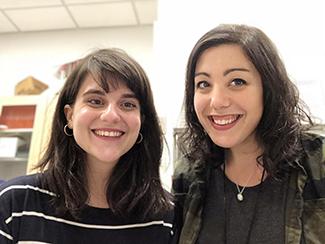
Julia Castello and Lauren Malave
According to the World Health Organization more than 300 million people worldwide suffer from depression. Unfortunately, the antidepressants commonly used to treat them only work for 50 percent of the population.
A recent paper published in the journal Molecular Psychiatry explores how a protein named CK2 could be playing a key role. The lead author of the paper, Julia Castello, is a biochemistry student at the CUNY Graduate Center working in Eitan Friedman's CUNY School of Medicine neuroscience lab at The City College of New York.
As the research points out, the most used antidepressants are called Selective Serotonin Reuptake Inhibitors (SSRIs). The problem is that there are 14 different types of serotonin receptors, but it is not known which are the mediators of the therapeutic effect of SSRIs. Castello, along with her team, are the first ones to identify CK2 as a modulator of a serotonin receptor, 5-HT4. Manipulation of CK2 in the brain decreases depressive and anxious states through the 5-HT4 receptor.
Castello says: “Identifying new targets broadens our understanding about the cause of depression as well as the mechanism of action of antidepressants, which could lead to the formulation of new antidepressants that work more efficiently and faster for more people.”
A separate study of CK2’s potential role in Parkinson’s is the subject of another research project at City College. Its findings, published in The Journal of Neuroscience in December, identify CK2 as a major player in the molecular mechanisms and targets that contribute to modulate L-DOPA induced dyskinesia. L-DOPA is currently the most effective medication available in the market. But a side effect of this drug is that after years of treatment, patients develop involuntary movements that can be debilitating.
The lead author of that paper is Marisol Cortes, a biochemistry major and City College Fellow now at Johns Hopkins. Lauren Malave, a RISE fellow student and lead scientist for dyskinesia at CCNY and Castello were also co-authors.
About The City College of New York
Since 1847, The City College of New York has provided a high quality and affordable education to generations of New Yorkers in a wide variety of disciplines. Today The Chronicle of Higher Education ranks CCNY #2 among public colleges with the greatest success in ensuring the social mobility of our student body; at the same time the Center for world University Rankings places it in the top 1.2% of universities worldwide in terms of academic excellence. More than 16,000 students pursue undergraduate and graduate degrees in eight professional schools and divisions, driven by significant funded research, creativity and scholarship. CCNY is as diverse, dynamic and visionary as New York City itself. View CCNY Media Kit.
Media contact: Rebecca Rivera rrivera1@ccny.cuny.edu 212.650.5310